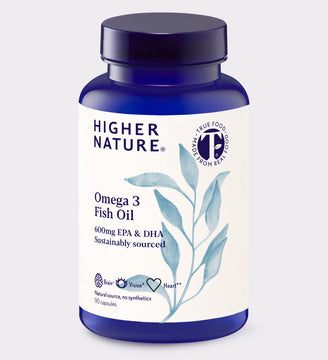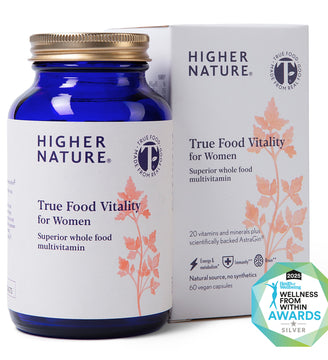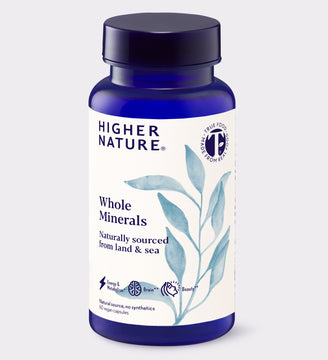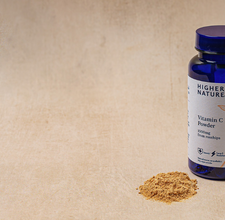
Vegan Diet: What do you do when your teen tells you they are going plant-based?
Higher Nature Nutrition Team
With the increasingly growing number of people going vegetarian or vegan, as a meat-eating family with little experience of vegan meals, what happens when your teenager decides they want to adopt this way of eating?
You probably have you have many questions such as:
- Is it healthy?
- What are they going to eat?
- What don’t they eat?
- Where do they get their protein?
- Where are they going to get their iron from?
As a nutritional therapist and vegetarian for over twenty years, I’m here to answer these questions and show you that with a bit of thought and planning, it doesn’t have to be complicated and it’s completely possible for your teenager to be healthy and thrive on a plant-based diet.
What does a vegetarian/vegan eat – or not eat?
Firstly, it may be helpful to define what is meant by the terms ‘vegetarian’ and ‘vegan’.
A vegetarian doesn’t eat meat or poultry, fish or seafood. It also excludes gelatine (so no more jelly babies!), animal rennet and stock or fat from animals.
A vegan diet excludes the above foods, as well as not eating eggs, dairy or honey.
Despite the seemingly extensive list of restrictions, that still leaves a lot of food that can be eaten. Vegetables, fruits, grains, pulses, nuts and seeds all become the staples of a plant-based diet. Vegetarians, of course, still eat dairy, eggs and honey, giving them slightly more options than their vegan counterparts. If you are used to incorporating a lot of meat and fish into your children’s diets, this may sound like a restrictive list.
Where do you start?
You will need to ensure they get a good balance of protein, carbohydrates and fat, but the good news is you can get all of these on a plant based diet - especially protein.
“Protein isn’t just found in meat, there are many plant sources that provide enough.”
The protein question
The protein question is definitely the most common one I have been asked. Perhaps one of the biggest misconceptions about adopting a plant-based diet is that you are not going to get any protein and become weak and fragile - that’s very much not the case.
The recommended amount of protein required by a 14-18 year old is about 0.85g of protein per kilogram of body weight. For example, a 14-18 year old who weighs 61kg needs about 52g of protein per day. Animal products are known for being “complete” sources of protein because they contain all the necessary amino acids which are the building blocks of muscles. However, many vegetables, pulses, legumes, nuts and seeds also contain a broad spectrum of amino acids so they are definitely a good alternative.
“Quinoa is well known for being a ‘complete’ protein.”
Other plant based protein sources include lentils, chickpeas and tofu, peas, edamame beans, hemp seeds, nuts, especially peanuts and almonds, as well as soya products, such as soya yoghurt. Vegetarians can still obtain protein from sources like yoghurt, eggs and other dairy products. Ensuring a wide variety of protein sources, not just picking one or two (as is essential for any healthy diet, not just a plant-based one) will ensure enough protein is obtained by the average teenager.
What about calcium?
The increasing plant-based trend has meant the growth in products such as plant-based milks, made from almonds, oats, soya, coconut, hazelnuts and hemp. The list continues to grow – you can even buy milk made from peas! No longer something you had to hunt down in a health food shop, they are widely available on the supermarket shelves. All with their different benefits and tastes, it is something to enjoy experimenting with!
If you were concerned about the lack of calcium, many of these plant milks are fortified with calcium.
You may also be surprised to find that calcium can be obtained from green leafy vegetables such as:
- Kale
- Watercress
- Broccoli
- Brussels sprouts
- Pak choi
- Almonds
- Chia seeds.
"So if your teen wants to be plant-based, they will need to eat their vegetables, no excuses!"
The importance of iron
Iron is an essential nutrient in the human body as it is needed for healthy blood cells which carry oxygen round the body. Iron deficiencies are quite common regardless of dietary choices! Girls have an increased need for iron, more so than boys, once they’ve started their periods. Again, a big misconception is that iron is only found in meat, but it can be obtained from other sources, such as dried apricots, lentils, flax seeds and pumpkin seeds as well as being found in fortified foods. The body absorbs it more easily when eaten with a food containing vitamin C, so porridge topped with flaxseeds, pumpkin seeds and strawberries, for example will tick both those boxes. As iron is such an important nutrient for growth, a deficiency of which can lead to anaemia, it is always one I would suggest supplementing with, especially in teenagers.
Isn’t fish important for growing brains?
The reason why fish, and oily fish in particular, is suggested for brain health is due to its high content of omega 3 fatty acids, which are required for brain function, the nervous system and immunity. There are several different types of omega 3 fatty acids: EPA and DHA is found in fish and plant sources contain ALA. ALA is found in good amounts in flax seeds, chia seeds, hemp seeds and walnuts and can be converted into EPA in the body. A tablespoon of flax seeds or chia seeds each day, which can be easily added to home-made smoothies or porridge will help ensure an adequate intake of ALA.
What else do you need to consider?
The two nutrients that are more challenging to obtain from plant sources are vitamin B12 and vitamin D.
Vitamin B
Anyone on a plant-based diet will need to supplement with B12 as it is only found in meat and fish. It is needed for energy levels and helps support mood. A deficiency can lead to anaemia, so it’s an important nutrient to consider as a vegetarian or vegan.
Vitamin D
Vitamin D is needed for healthy bones and to support the immune system. While the best source of Vitamin D is the sunlight, a long grey winter will deplete our stores, so a supplement may be helpful. Vegetarians can obtain vitamin D from eggs, but vegans are more likely to need a supplement, especially in winter.
What about a multivitamin?
While obtaining as much of the daily nutrient needs from the diet is the ideal for anyone, regardless of dietary preferences, it is not always possible. For a growing teenager, it is important that they obtain adequate nutrients as they grow and develop. In these cases, a supplement may be helpful to cover all bases, not just the ones where intake may be lower due to a plant-based diet. If you feel your teen does need extra support, one thing to keep in mind before you buy any vitamins, is to read the label and check that it they are suitable for a vegetarian or vegan diet, as not all supplements are!
Final thoughts
It is now easier than ever to be plant-based, because of the rapidly growing market of meat alternatives. There are now vegan versions of pretty much everything, from burgers to pizza made with vegan cheese. However, just because something has the vegan label, doesn’t mean it is healthy. Any junk food should be for occasional and not for daily consumption, and the same applies to vegan junk food. Ensure your teen gets an adequate intake of vegetables, fruits, grains, pulses, nuts and seeds (plus dairy and eggs for the vegetarians) and the odd vegan burger will be an enjoyable treat.


















